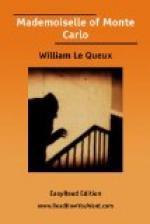He quickly found Lady Ranscomb’s number in the directory, and a few moments later was talking to the butler, of whom he inquired for Miss Dorise.
“Tell her,” he added, “that a friend of Mr. Henfrey’s wishes to speak to her.”
In a few moments The Sparrow heard the girl’s voice.
“Yes?” she inquired. “Who is speaking?”
“A friend of Mr. Henfrey,” was the reply of the man with the gloved hand. “You will probably guess who it is.”
He heard a little nervous laugh, and then:
“Oh, yes. I—I have an idea, but I can’t talk to you over the ’phone. I’ve got somebody who’s just called. Mother is out—and——” Then she lowered her voice, evidently not desirous of being heard in the adjoining room. “Well, I don’t know what to do.”
“What do you mean? Does it concern Mr. Henfrey?”
“Yes. It does. There’s a man here to see me from Scotland Yard! What shall I do?”
The Sparrow gasped at the girl’s announcement.
Next second he recovered himself.
“A man from Scotland Yard!” he echoed. “Why has he called?”
“He knows that Mr. Henfrey is living at Shapley, in Surrey. And he has been asking whether I am acquainted with you.”
TWENTY-THIRD CHAPTER
WHAT LISETTE KNEW
A fortnight had gone by.
Ten o’clock in the morning in the Puerta del Sol, that great plaza in Madrid—the fine square which, like the similarly-named gates at Toledo and Segovia, commands a view of the rising sun, as does the ancient Temple of Abu Simbel on the Nile.
Hugh Henfrey—a smart, lithe figure in blue serge—had been lounging for ten minutes before the long facade of the Ministerio de la Gobernacion (or Ministry of the Interior) smoking a cigarette and looking eagerly across the great square. The two soldiers on sentry at the door, suspicious of all foreigners in the days of Bolshevism and revolution, had eyed him narrowly. But he appeared to be inoffensive, so they had passed him by as a harmless lounger.
Five minutes later a smartly-dressed girl, with short skirt, silk stockings, and a pretty hat, came along the pavement, and Hugh sprang forward to greet her.
It was Lisette, the girl whom he had met when in hiding in that back street in Genoa.
“Well?” he exclaimed. “So here we are! The Sparrow sent me to you.”
“Yes. I had a telegram from him four days ago ordering me to meet you. Strange things are happening—it seems!”
“How?” asked the young Englishman, in ignorance of the great conspiracy or of what was taking place. “Since I saw you last, mademoiselle, I have been moving about rapidly, and always in danger of arrest.”
“So have I. But I am here at The Sparrow’s orders—on a little business which I hope to bring off successfully on any evening. I have an English friend with me—a Mr. Franklyn.”




